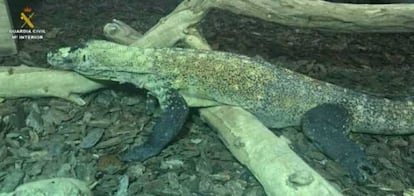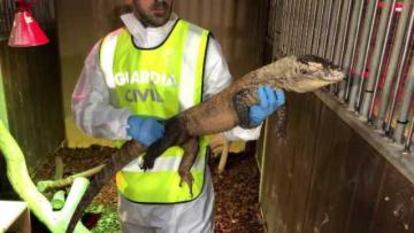Police nab man who kept Komodo dragon in Catalonia
It is the first illegally acquired lizard of its kind to be found by authorities in Europe

In a European first, authorities have found an illegally acquired Komodo dragon, an endangered species, living in precarious conditions inside a property in Cornellà de Llobregat, in Spain’s northeastern region of Catalonia.
The Nature Protection Service (Seprona) of the Civil Guard on Tuesday found an injured specimen of the largest living species of lizard, which is native to Indonesia and can grow to three meters in length. One of its hands was missing and its tail had been partially cut off.
The Komodo dragon had been illegally acquired along with 20 specimens of other protected species including a rattlesnake and a scorpion. These were living together with a large number of mice on which the animals were feeding.

They were in the care of a local resident who was described as a 43-year-old US citizen who has been arrested on charges of crimes against protection of flora and fauna, smuggling and illicit arms possession.
The man was seen going to the premises on a regular basis to clean and feed the animals. When he washed down the dragon and the other species, he used to chuck the “excess dirty water, material and excrement” into the street.
Once they have bitten their victim, they lie in wait until the effect of the saliva takes hold
In a press release, the Civil Guard suggested that the raid was triggered by a tip-off, after receiving “information indicating the possibility that an individual may be illegally in possession of specimens covered by CITES (international convention on international trade in endangered species).”
Officers raided the premises on July 5, and found a collection of live animals, mostly reptiles, that included the Komodo dragon (Varanus Komodensis), a rattlesnake (Crotalus Atrox), a scorpion, various pythons from different families, lizards and a sand boa (Erix Colubrinus).
However, the really striking discovery was the Komodo dragon, which is the first illegally acquired specimen to be located in Europe, according to Europol.
In their natural habitat, these are the largest lizards in the world – 100 times bigger than the smallest lizard species. They can eat more than 50% of their body weight in a single sitting, and they can reach speeds of up to 20 kilometers per hour. Their teeth, like sharks', can grow back. Their bites often infect their prey due to the presence of bacteria in their saliva. This allows them to hunt animals much bigger and faster than themselves: once they have bitten their victim, they lie in wait until the effect of the saliva takes hold.
The animals have been relocated in different zoological centers in Barcelona and in the Recovery Center for Amphibians and Reptiles of Catalonia (CRARC), while the two poisonous animals (the rattlesnake and the scorpion) were handed over to the Escola de Natura de Paretsin Vallés (Barcelona).
English version by John Clarke.
Tu suscripción se está usando en otro dispositivo
¿Quieres añadir otro usuario a tu suscripción?
Si continúas leyendo en este dispositivo, no se podrá leer en el otro.
FlechaTu suscripción se está usando en otro dispositivo y solo puedes acceder a EL PAÍS desde un dispositivo a la vez.
Si quieres compartir tu cuenta, cambia tu suscripción a la modalidad Premium, así podrás añadir otro usuario. Cada uno accederá con su propia cuenta de email, lo que os permitirá personalizar vuestra experiencia en EL PAÍS.
¿Tienes una suscripción de empresa? Accede aquí para contratar más cuentas.
En el caso de no saber quién está usando tu cuenta, te recomendamos cambiar tu contraseña aquí.
Si decides continuar compartiendo tu cuenta, este mensaje se mostrará en tu dispositivo y en el de la otra persona que está usando tu cuenta de forma indefinida, afectando a tu experiencia de lectura. Puedes consultar aquí los términos y condiciones de la suscripción digital.








































